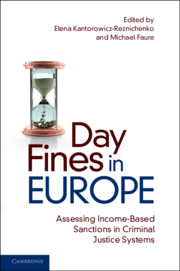Book contents
- Day Fines in Europe
- Day Fines in Europe
- Copyright page
- Contents
- Figures
- Tables
- Contributors
- Acknowledgements
- Abbreviations
- 1 Introduction
- 2 Theoretical Perspectives on Day Fines
- 3 Day Fines in Finland
- 4 Day Fines in Sweden
- 5 Day Fines in Denmark
- 6 Day Fines in Germany
- 7 Day Fines in Austria
- 8 Day Fines in Hungary
- 9 Day Fines in France
- 10 Day Fines in Portugal
- 11 Day (Unit) Fines in England and Wales
- 12 Day Fines in Slovenia
- 13 Day Fines in Spain
- 14 Day Fines in Poland
- 15 Day Fines in Croatia
- 16 Day Fines in Switzerland
- 17 Day Fines in Czech Republic
- 18 Day Fines in Romania
- 19 Comparative Law and Economics Perspective on Day Fines
- Index
- References
11 - Day (Unit) Fines in England and Wales
Published online by Cambridge University Press: 11 June 2021
- Day Fines in Europe
- Day Fines in Europe
- Copyright page
- Contents
- Figures
- Tables
- Contributors
- Acknowledgements
- Abbreviations
- 1 Introduction
- 2 Theoretical Perspectives on Day Fines
- 3 Day Fines in Finland
- 4 Day Fines in Sweden
- 5 Day Fines in Denmark
- 6 Day Fines in Germany
- 7 Day Fines in Austria
- 8 Day Fines in Hungary
- 9 Day Fines in France
- 10 Day Fines in Portugal
- 11 Day (Unit) Fines in England and Wales
- 12 Day Fines in Slovenia
- 13 Day Fines in Spain
- 14 Day Fines in Poland
- 15 Day Fines in Croatia
- 16 Day Fines in Switzerland
- 17 Day Fines in Czech Republic
- 18 Day Fines in Romania
- 19 Comparative Law and Economics Perspective on Day Fines
- Index
- References
Summary
Following a two-decade long conversation, the Criminal Justice Act of 1991 introduced a system of income-related fines in England and Wales, known as ‘unit fines’. This system turned out to be remarkably short-lived. The practical difficulties that surrounded its operation, alongside intense criticism from parts of the media, led not its reform, but instead to its abrupt abolition a few months later. This Chapter begins by discussing the policy rationales that underpinned the adoption of ‘unit fines’ in England and Wales, before taking a closer look into the statutory framework. Then, it explores the reasons why this fining system failed to take roots in England and Wales, by looking at the challenges that followed its implementation. These challenges, coupled with the magistrates’ perception that this system was too rigid, and the growing discontent from parts of the press, led to its rapid demise. Since then, policymakers have considered the possibility of re-introducing income-related fines a number of times, but the idea was never embraced. Unit fines have instead been replaced by a system that sits in the middle of the spectrum between fixed and day fines.
Keywords
- Type
- Chapter
- Information
- Day Fines in EuropeAssessing Income-Based Sanctions in Criminal Justice Systems, pp. 195 - 215Publisher: Cambridge University PressPrint publication year: 2021

